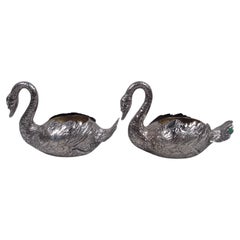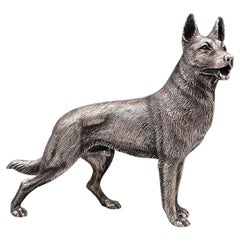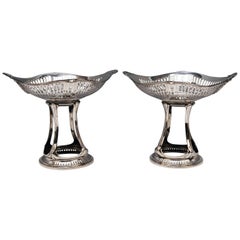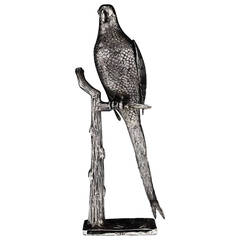Gebruder Neumann Furniture
to
1
1
1
1
1
1
1
Pair of German Silver Swans with Hinged Wings
By Buchholz & Zelt 1, Gebruder Neumann
Located in New York, NY
Pair of German 800 silver figural bird bowl, ca 1920. Each: Swan with ovoid body, upturned tail, and scaly-s-scroll neck terminating in in closed bill. Imbricated feathers and hinged...
Category
Early 20th Century German Edwardian Gebruder Neumann Furniture
Materials
Silver
Antique Late 19th Century German 930, Silver Rococo Lady's Shoe with Elf Toe
By Gebruder Neumann
Located in Braintree, GB
Antique German 930. silver Rococo Lady's shoe with elf toe
Shoe is with chased scrolls, floral garlands and open bands.
Made in Germany.
Maker: Gebruder Neumann
Imported to...
Category
1890s German Antique Gebruder Neumann Furniture
Materials
Sterling Silver
Related Items
20th Century Italian Sterling Silver German Shepherd Dog Sculpture
By Arval Argenti Valenza
Located in VALENZA, IT
German Shepherd dog sculpture in sterling silver.
The sculpture of the German Shepherd dog was made with the 925 sterling silver casting method and masterfully finished with chisel ...
Category
Late 20th Century Italian Other Gebruder Neumann Furniture
Materials
Sterling Silver
Silver Art Nouveau Pair of Centrepieces Holders Bruckmann and Sons, Germany 1900
By Bruckmann & Söhne
Located in Vienna, AT
Silver German pair of centrepieces / centerpieces made by Bruckmann & Sons (Germany).
Art Nouveau (made circa 1900)
Silver 800
branded by German Crescent with Crown
Manufactory:
Eagle Mark of Bruckmann & Soehne (= SONS), Heilbronn (Germany)
Peter Bruckmann (1865-1937) was the first Chairman of the Deutscher Werkbund (founded 1907).
Size:
Height 18.5 cm ( 7.28 inches)
Width 22.5 cm ( 8.85 inches)
Depth 19.5 cm ( 7.67 inches)
Total weight: 940 grams / 33.08 OZ / 30.22 troy ounces
Specifications:
Excellently manufactured pair of silver centrepieces / stands / holders:
Each of the reticulated oval bowls are based on four slim as well as concave supports which are attached to round base: Edge of these bases is of reticulated type, too. The bowls' corners are decorated with lockets framed...
Category
Early 1900s German Art Nouveau Antique Gebruder Neumann Furniture
Materials
Sterling Silver
H 7.28 in W 8.85 in D 7.67 in
Silver 800 Cutlery Set for 12 People, Düsseldorf, Germany, Late 19th Century
Located in Buenos Aires, Buenos Aires
Silver 800 cutlery set for 12 people. Düsseldorf, Germany, late 19th century.
Jugendstil period.
Complete for 12 people.
A total of 164 pieces:
12 ...
Category
Late 19th Century German Jugendstil Antique Gebruder Neumann Furniture
Materials
Sterling Silver
H 13 in W 21.26 in D 17.72 in
Two German Antique Porcelain Figurines, Rococo Couple, 19th Century
Located in Copenhagen, DK
Two German antique porcelain figurines. Rococo couple. 19th century.
Largest measures: 12 x 7 cm.
In very good condition. Woman's ...
Category
19th Century German Rococo Revival Antique Gebruder Neumann Furniture
Materials
Porcelain
Pair of Sterling Silver Swan Decorative Bowls Signed Gorham Sterling
By Durgin-Gorham 1
Located in New York, NY
This beautiful pair of Art Deco Sterling silver swan decorative bowls were executed by the legendary American silver maker, Gorham circa 1920. They feature elegantly streamlined demi...
Category
1920s American Art Deco Vintage Gebruder Neumann Furniture
Materials
Sterling Silver
Pair of 19th Century Continental Silver Table Figures of Peacocks
Located in West Palm Beach, FL
Pair of 19th Century Continental silver table figures of peacocks
Germany, Circa 1880s
Each one realistically cast, modeled and chased figures/models of standing peacocks...
Category
Late 19th Century German Antique Gebruder Neumann Furniture
Materials
Sterling Silver
A Silver Austrian Hannukah Lamp, late 19th Century
Located in New York, NY
An elegant Austrian Hanukkah lamp made in the late 19th century.
The Backplate of this Hanukkah lamp is designed similar to many Torah shields made in that province and that part of...
Category
1870s Austrian Antique Gebruder Neumann Furniture
Materials
Silver
Salviati Glass Raised Bowl and Salts with Swan Motif
By Salviati
Located in New York, NY
An fine arrangement of Salviati blown glass pieces, in varied tones of green and infused with gold flecks, including a raised bowl featuring a swa...
Category
Early 20th Century Italian Gebruder Neumann Furniture
Materials
Gold Leaf
Woven Hinged Lid Picnic Basket with Handles
Located in Los Angeles, CA
Vintage woven picnic basket with solid lid on hinge and handles
This basket is a classic shape and texture and would be a great "cottagecore" addition to many rooms. Unique storage for dog toys...
Category
Mid-20th Century Folk Art Gebruder Neumann Furniture
Materials
Wood
19th Century Italian Sterling Silver Madonna, circa 1830
Located in Milano, IT
Embossed and engraved silver plaque
La Madonna del lago (The Madonna of the Lake)
Probably Milan, post 1824
Brass frame
It measures 16.14 in x 13.85 in (41 x 35.2 cm) and it weighs 10.357 pounds (4.698 g): silver 1.31 pounds (598 g) + brass 9.03 pounds (4.100 g)
State of conservation: some abrasions on the bottom. The frame is old, but not original.
The plaque is made up of a sheet of embossed and engraved silver, and held in a solid brass frame. It depicts the “Madonna del lago” – “Madonna of the Lake” - (the Madonna with Child and San Giovannino) by Marco d'Oggiono (Oggiono, 1474 circa - Milan, 1524 circa), while changing only the background landscape. Almost certainly the subject reproduced in the plaque was taken from a famous engraving by Giuseppe Longhi (Monza, 1766 - Milan, 1831), one of the greatest engravers of his era.
The silver is unmarked, probably because originally the Madonna was due to be exposed in a church: sometimes precious metals destined for worship and liturgical use would be exempted from payment and were, therefore, not marked.
It is very likely that the plaque was made in Milan because in this city in 1824 the engraving by Giuseppe Longhi was made and printed. In addition, in Milan, the alleged lost painting by Leonardo da Vinci in his Milanese period (1482-1500) would be produced; this is the painting from which Marco d'Oggiono took his version.
The painting
Marco d?Oggiono was one of Leonardo da Vinci's most brilliant students and collaborators (D. Sedini, Marco d’Oggiono, tradizione e rinnovamento in Lombardia tra Quattrocento e Cinquecento, Roma 1989, pp. 151-153, n. 56; p. 225, n. 124, with previous bibliography). His style reflects in every way that of the Tuscan Maestro, so much so that he was the one who executed some copies of da Vinci's paintings. The execution of the “Madonna del Lago” probably draws inspiration from a lost painting by the Maestro, created while he was living in Milan (1482-1500). There are many similarities with other works by Leonardo such as the “Vergine delle rocce” or the “Vergine con il Bambino e San Giovannino, Sant’Anna e l’Agnello”.
The painting, from which the drawing and then the famous engraving were taken, is found today at the M&G Museum of Bob Jones University in Greenville, South Carolina, where it came to rest after the sale of the Harrington Collection in London in 1917.
The work appears in the inventories of the collection of Napoleon and Joséphine Bonaparte at the castle of Malmaison, before 1809.
The Malmaison building was born and developed in the 17th and 18th centuries. In the 18th century it belonged to Jacques-Jean Le Coulteux du Molay, a wealthy banker. Later, during the Directory, Joséphine Bonaparte de Beauharnais bought it on April 21st, 1799, but settled at the castle definitively only after her husband separated from her in 1809. She remained there until 1814, the year of her death. When Joséphine died, the estate passed to her son Eugène de Beauharnais, who moved to Munich with his whole family in 1815, bringing with him the collection of paintings he inherited from his mother. Eugène died in 1824 and his wife Augusta of Bavaria (von Bayern), unable to keep it, in 1828 sold the Malmaison to the Swedish banker Jonas-Philip Hagerman.
It is likely that in this period Augusta also sold part of the paintings inherited from her husband, including the “Madonna del Lago”. This painting then came into the possession of Leicester Stanhope, fifth Earl of Harrington (1784 - 1862) and then was passed down to his descendants.
In 1917, at the death of Charles, eighth Earl of Harrington, his brother Dudley inherited the title and properties and he put up a part of his collections for sale. Among these, precisely, the painting by Marco d'Oggiono was to be found.
On the occasion of that auction the painting was presented as a work by Cesare da Sesto, by virtue of a handwritten note by the Countess of Harrington on the back of the table. However, already in 1857, the German critic Gustav Waagen had identified Marco d'Oggiono as the author of the painting, then exhibited in the dining room of Harrington House in London (Treasures of Art in Great Britain, in 4 volumes, London, 1854 and 1857).
The engraving
Giuseppe Longhi was one of the most renowned engravers in Italy between the end of the 18th century and the first quarter of the 19th century.
In 1824 Giuseppe Longhi, based on a design by Paolo Caronni, made a famous engraving of the painting of Marco d?Oggiono. The activity of Longhi was then at the peak of his notoriety, enough to earn him very substantial commissions; it is not risky to suppose that some of his successful engravings were also reproduced using other means: in our case in silver. (A. Crespi, a cura di, Giuseppe Longhi 1766–1831 e Raffaello Morghen...
Category
1820s Italian Neoclassical Antique Gebruder Neumann Furniture
Materials
Sterling Silver, Brass
19th Century Biedermeier Money Box German Silver Engraved with Knight and Lady
Located in Epfach, DE
A rare money box from the Bidermeier period in silver with small lock that can be opened and closed without a key.
Very special is the fine engraving on the seven fields, which are ...
Category
19th Century German Antique Gebruder Neumann Furniture
Materials
Silver
H 3.15 in W 1.97 in D 3.15 in
Tinos Art Deco Bronze Dish with Swans, 1930s
By Tinos
Located in Esbjerg, DK
Hand-decorated, textured and heavy Art Deco bronze bowl or dish with a center-motif of swans in relief. Designed and manufactured by Tinos in Copenhagen Denmark during the 1930s. The...
Category
1930s Danish Art Deco Vintage Gebruder Neumann Furniture
Materials
Bronze
Previously Available Items
German Hanau Solid Silver Large Parrot Figure on Stand, circa 1910
By Gebruder Neumann
Located in Royal Tunbridge Wells, Kent
Antique early 20th Century German Hanau Solid Silver large and decorative figure modelled as a parrot, particularly large, very naturalistically well-refined, with hinged wings and p...
Category
1910s Gothic Revival Vintage Gebruder Neumann Furniture
Materials
Silver
Free Shipping
H 13.98 in W 5.32 in D 3.94 in
Gebruder Neumann furniture for sale on 1stDibs.
Gebruder Neumann furniture are available for sale on 1stDibs. These distinctive items are frequently made of sterling silver and are designed with extraordinary care. There are many options to choose from in our collection of Gebruder Neumann furniture, although silver editions of this piece are particularly popular. If you’re looking for additional options, many customers also consider furniture by Sitzendorf Porcelain Factory, Robert Brendel, and Carl Thieme. Prices for Gebruder Neumann furniture can differ depending upon size, time period and other attributes — on 1stDibs, these items begin at $1,487 and can go as high as $1,487, while a piece like these, on average, fetch $1,487.




